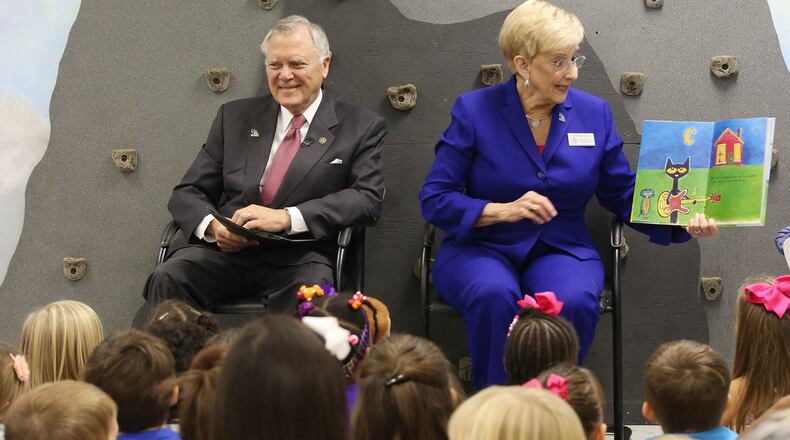But with a staunch education change advocate poised to take control of the U.S. Department of Education, and allies of Gov. Nathan Deal pledging an education agenda in the next legislative session, it is unclear how the ground will shift in 2017.
Here are some key events in Georgia education in 2016, and a look at what may be coming in 2017.
1. Some tests left behind ...
Building on the spirit of Congress's re-write of education policy via the Every Student Succeeds Act, Georgia lawmakers relaxed the state's testing mandate, voting in March to reduce the number of required exams over a student's K-12 career to 24 from 32. That's still more than the 17 required under the new federal law, which succeeded the test heavy No Child Left Behind Act. But it indicates a change in direction. The legislation, subsequently signed by Gov. Nathan Deal, also downplayed the role of test results in teacher evaluations.
2. Other tests come with glitches ...
As if to confirm the direction taken by lawmakers to rollback testing, the state's May administration of the Milestones tests on computers was hampered by widespread disruptions. The glitches, with computers gobbling entire writing passages mid-test, causing consternation and tears in the classroom, led the Georgia Department of Education to waive the requirement that school districts use the results to determine in passing younger students from one grade to the next.
3. Bathroom brawl ...
Student bathroom access took over discussions about school policy in May, when the Obama administration issued a directive suggesting that schools allow students to use the restroom or locker room that fits their gender identity. Georgia joined other states in a lawsuit against the directive, which threatened loss of federal funding for non-compliance. Obama recently suggested that the emphasis on the controversial issue instead of core economic issues helped to undermine support for Democrats in rural areas.
4. The virtues of a virtual education ...
National criticism of online charter schools by charter school advocates in June raised questions about operators in Georgia. They've enrolled a significant proportion of the state's students and haven't done well on state performance measures, leading to scrutiny by the State Charter Schools Commission. A state audit raised yet more questions, in this case about the accuracy of enrollment reports at several of these schools. They get taxpayer dollars based on the number of students enrolled.
5. No opportunity for Deal ...
Voters in November rejected a constitutional amendment that would have allowed the governor to take over schools deemed to be chronic failures or, as Deal once put it, to "rescue children languishing in them." The decisive defeat of his Opportunity School District proposal -- driven by a bipartisan coalition that included the PTA, school boards and black leaders -- was read by some as a loss of confidence in his direction on educational policy. But his allies are pledging a comeback in the 2017 legislative session. "My take-away from the result of the 2016 vote is that voters don't want half-measures. They are seeking broader reform of education with real power going to the individual family and community," State Rep. Christian Coomer, R-Cartersville, told The Atlanta Journal-Constitution.
6. Hold onto your hat ...
Also in November, of course, voters elected Trump for president. Last spring, even the mention of his name, in chalk, was enough to trigger fear and outrage among some students at Emory University, causing a dustup for the school leadership. Trump's election could bring more substantive controversy, with his selection of billionaire school voucher proponent Betsy DeVos as education secretary. What that means for Georgia is anyone's guess, but Coomer, the state representative, said he believes voters want "real control over the education choices" for their families, and that word is code for a lot of things, from charter schools to vouchers. Every year, some lawmaker or another proposes some variant of vouchers. Will 2017 be the year that Georgia opens the door wide for them?
7. Money, winners and losers ...
One of the biggest things to look out for when the legislative session begins Jan. 9 is Deal's proposal to overhaul Georgia's decades-old school funding formula. He has said he doesn't plan to scale back his education agenda in 2017 even as he braces for the fallout over his vetoes of two measures that passed the General Assembly in 2016 -- a campus gun-carry law and a "religious liberty" law. Deal also wants to change how teachers are paid, charter school policy, early childhood learning and school "flexibility," but the funding formula could have the greatest impact. Education eats a big slice of the state budget yet the amount that goes to schools has still been too low over more than a decade, at least technically. The formula, which dates from the 1980s, establishes the state dollars that each school should receive based on the characteristics of the students it serves. In the early 2000s, the state began implementing annual "austerity" cuts to the education budget. Deal has largely filled that hole, yet a gap remains. He has tough words for those who complain about the cuts and has vowed to rework the formula. He hasn't said how, but the Education Reform Commission he created in 2015 issued a recommendation that could form the basis for whatever legislation he proposes. It does not set a minimum level of funding, which would make it harder for critics to complain about inadequate funding.
About the Author
Keep Reading
The Latest
Featured



